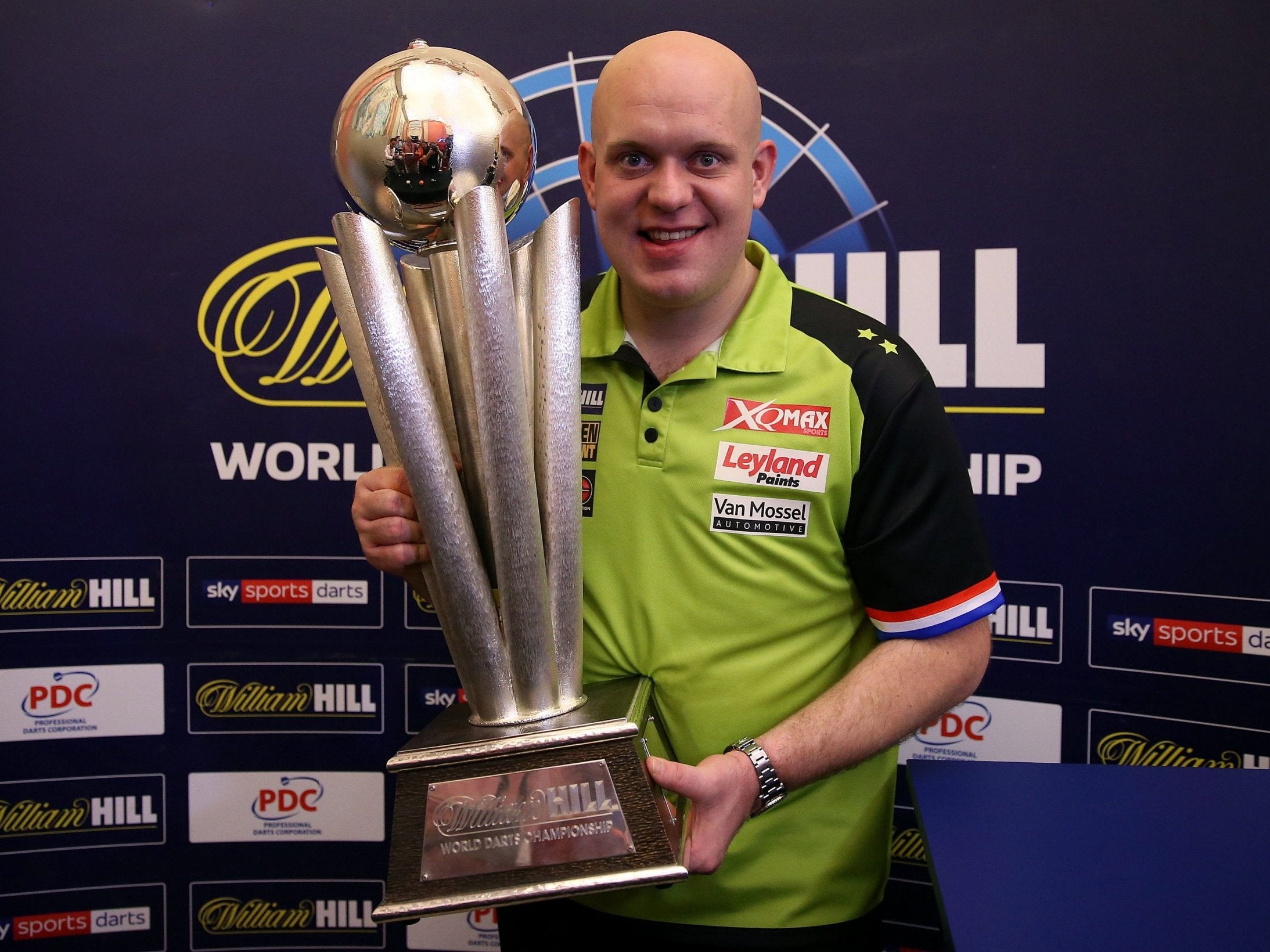PDC World Darts Championship final: Michael van Gerwen beats Michael Smith to claim third world title
World No1 clinches his third world title with a 7-3 victory over Michael Smith

This was not Michael van Gerwen’s most satisfying kill. Nor was it his most spellbinding or satisfying. But when you’ve just won your third world title, perhaps we’re just splitting hairs. In taking apart the brave but skittish Michael Smith by seven sets to three, he finally lifted himself out of the pack of two-time world champions and took his biggest stride yet down the road to darting greatness.
That van Gerwen is the most gifted player of his generation we have known for some time. Now, he is finally beginning to gild his genius with the multiple world titles that he had always threatened to win. Only Phil Taylor (16), Eric Bristow and Raymond van Barneveld (five each) now sit above him, and as he lifted the Sid Waddell Trophy he flashed that familiar half-smile-half-snarl of a man whose business is still far from finished: a self-belief verging on naked arrogance. He does not celebrate his 30th birthday for another few months.
It wasn’t his finest vintage. An average of 102 was modest by his standards. After rampaging into a 4-0 lead after just 40 minutes, the doughty Smith pegged him back to 4-2, egged on by a crowd weighted firmly in his favour, who by the end were not merely cheering van Gerwen’s missed doubles but even his single-20s. But really, this was a match that only ever offered the illusion of closeness. Smith - the former world youth champion from St Helens - averaged 95, hit 13 maximums, took out some nice finishes. He was extremely competent. But against van Gerwen, mere competence was only ever going to be enough for a runner’s-up cheque.
Even in middling form, the chances van Gerwen gives you are infinitesimal. Microscopic. You can barely even call them chances. They’re a fleeting glimpse of a red coat in a crowded train station at rush hour. They’re a single dandelion seed in a howling gale. Perhaps he’s started a leg with only 96. Perhaps he’s given you a single dart at the bull. Either way, their very scarcity makes them all the harder to take. You’re bleakly aware that they don’t last long. And so a little bead of sweat accumulates on your brow. The muscles in your shoulder begin to twitch and twist. At the very moment you need your arm at its freest, your mind at its clearest, you have neither.
And at no stage did Smith offer the sort of confidence or consistency that might suggest an ability to master the occasion. He’ll learn plenty from this defeat: the casual brutality of set play, the relentlessness of van Gerwen’s front-running, the art of attriting an opponent through clutch doubles and sheer force of personality. It wasn’t just that van Gerwen hit 46% of his doubles to Smith’s 40%. It was when he hit them: detonating them for maximum emotional impact, sensing Smith’s wounds and pushing a podgy finger straight into them.
There was a reason Smith threw five points below his tournament average in the biggest match of his life. He didn’t miss in a vacuum. He missed because of the man standing just a few feet behind him, the intense aura emanating from that bright green shirt, the heat from the stage lights bouncing off that shiny bald head and tearing right through his guts. He had four darts to win the fourth set, and missed them all. Throwing to save the seventh set at 4-2 down, he went eight darts without a treble. With double-10 to get and two darts in his hand to reduce the deficit to 5-3, he missed both. He’d thrown thousands, perhaps millions, of darts in his life. But until he stepped onto this stage on this night, a single dart had never meant this much before.

It was the first final since 1983 to be contested by two players under 30, a measure not simply of a bright future but an exhausting present. Darts is a young man’s game now: a year-round, energy-sapping global treadmill that burns out its protagonists far quicker than it used to. One by one, the greats of yesteryear are falling away: Taylor has gone, van Barneveld is going this year. Of this year’s last 16, 13 were aged 35 or younger.
Smith is 28, rises to No6 in the world on the back of this tournament, and will surely be back. His mentor Gary Anderson tells anyone who’ll listen that he’s a future world champion. But like every other player of his generation, for now he continues to labour in van Gerwen’s shadow. And it’s a shadow that seems to grow darker and ever more indomitable with each passing year.
Join our commenting forum
Join thought-provoking conversations, follow other Independent readers and see their replies
Comments
Bookmark popover
Removed from bookmarks